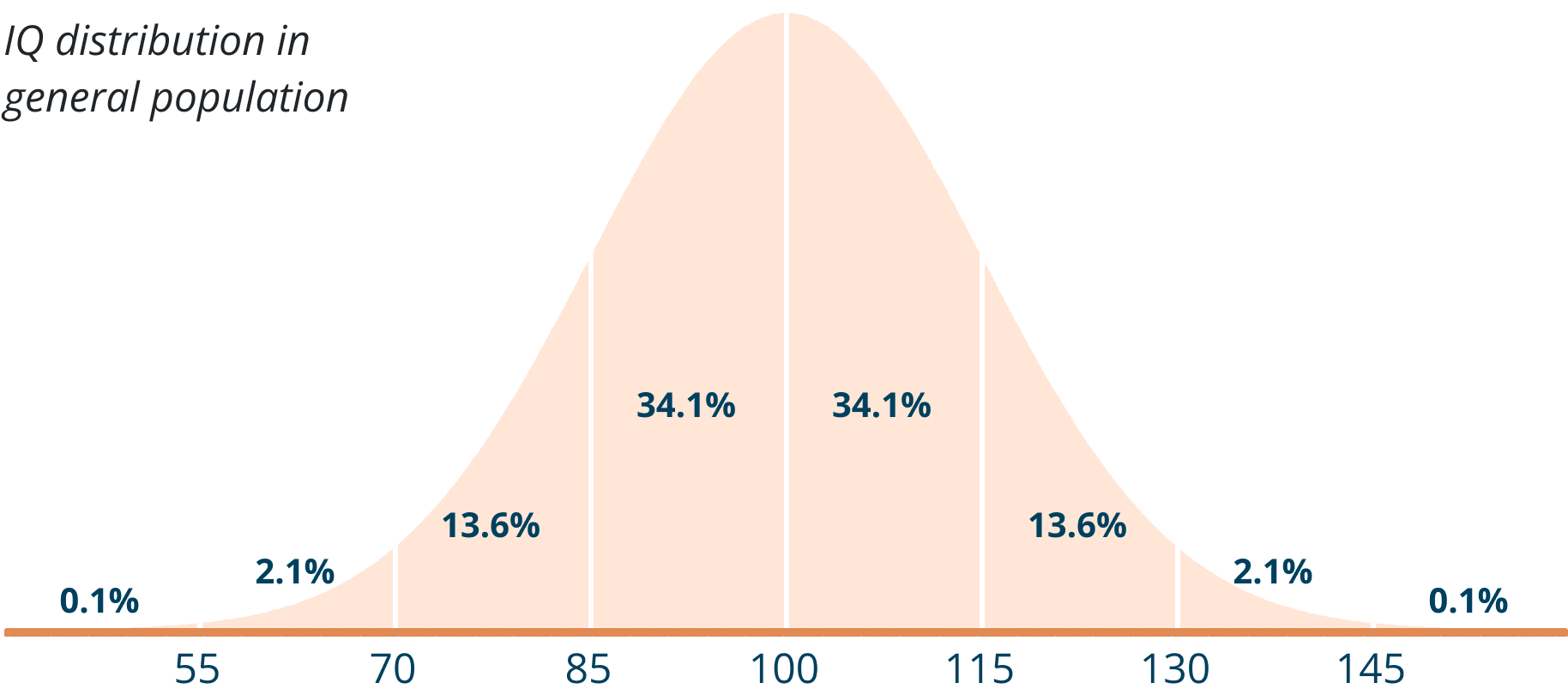
*Accurate testing and Instant results for free
Find out how smart you are by answering the questions.
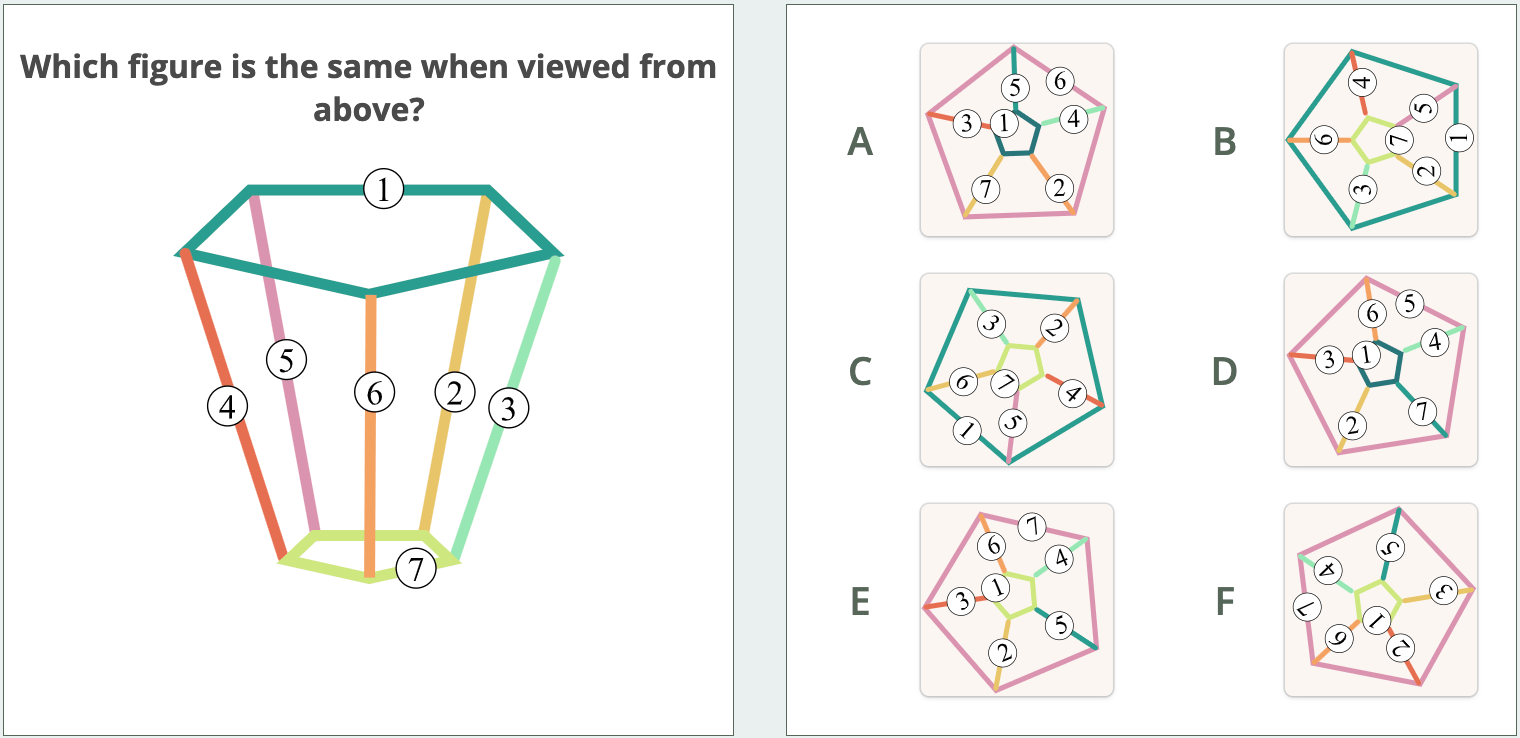
This IQ test provides an estimate of general cognitive abilities, expressed through an IQ score ranging from 70 to upper 160, with 100 representing the average for the population. The IQ test is crafted and developed by professionals in the field of psychology and human brain research.
The assessment comprises 30 questions, and participants have a 20-minute time limit to solve them. This online IQ test is designed to accommodate individuals of all age groups. The puzzles, depending on the participant’s real latent trait, are increasing in difficulty with every correct answer. The results will be instantly given to participants right after they finish the test. Wondering what is your IQ? Take the IQ test now and discover!
IQ (Intelligence Quotient) is a numerical representation of a person's intellectual abilities in relation to the general population. It measures cognitive abilities, including reasoning, problem-solving, memory, and other aspects of intelligence.
IQ Score is a numerical value derived from an IQ test. It refers to an individual’s performance in relation to the score of others in the entire population. The average IQ score is set at 100, with a standard deviation of 15. This means that the majority of the population falls within one standard deviation of the average, so scores between 85 and 115 are considered within the normal range.
The IQ Test (Intelligence Quotient Test) is a standardized assessment designed to measure a person’s cognitive abilities in various facets of intelligence, including logical reasoning, mathematical skills, spatial reasoning, problem-solving, and even verbal abilities.
Taking an IQ test is not compulsory, but it’s recommended for several reasons:
First of all, taking an IQ test can help individuals gain insight into their cognitive abilities and strengths. Understanding one's intellectual strengths and weaknesses can be valuable for personal development.
Secondly, taking an IQ test is necessary for educational planning. IQ scores are often used in educational settings to identify students who may benefit from special programs or additional support. For example, students with exceptionally high IQ scores might be eligible for gifted and talented programs.
Thirdly, some careers may require specific cognitive abilities, and knowing one's IQ can be helpful in career planning. It can also provide guidance on areas for improvement and skill development.
Last but not least, IQ tests are designed to measure problem-solving abilities, critical thinking, and logical reasoning. Engaging in these tests can help individuals enhance their analytical skills.
Our free online IQ test is more than just a series of questions; it's a dynamic exploration of your cognitive landscape. With a series of questions covering three main facets (numeric reasoning, logical reasoning, and spatial reasoning), our test is designed to challenge and engage participants, providing a comprehensive snapshot of their intellectual capabilities.
An IQ test comprises 30 thought-provoking questions. These questions are strategically curated to cover various cognitive domains, including numerical reasoning, logical thinking, and spatial recognition. You will start with the easiest question (level 1 difficulty). The arrangement of questions is designed to challenge you progressively, allowing you to explore the depths of your intellectual prowess. Importantly, there is no penalty for incorrect answers; participants will be given the easier question instead.
Dive into a diverse series of question types that mirror the complexity of real-world problem-solving. Whether you're deciphering numerical patterns, untangling spatial intricacies, or navigating logical mazes, each question is a step toward uncovering the unique facets of your intelligence.
Numerical reasoning questions assess your ability to understand and manipulate numerical information. These questions often involve basic arithmetic, number sequences, and logical reasoning applied to numerical data.
Example Question:
Number Sequences: Identify the missing number in the sequence: 2, 4, 8, 16, __.
Solution: The sequence follows a pattern of doubling the previous number. So, the missing number is 32.
Tips for Success:
Logical reasoning questions evaluate your ability to analyze patterns, relationships, and sequences. They often involve deductive reasoning, syllogisms, and identifying the next logical step in a sequence.
Example Question:
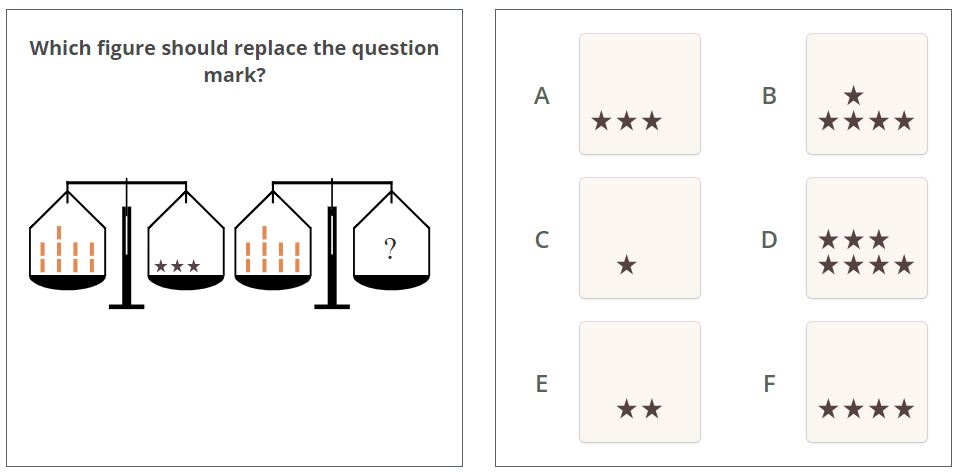
The screenshot of a logical question in the IQ test's question bank
Solution: The figures are the same on both sides of the scale. The weight of both the figures has to be the same as well → The correct answer is A.
Tips for Success:
Spatial reasoning questions assess your ability to mentally manipulate and visualize objects in space. These questions often involve mental rotation, mirror images, and completing visual patterns.
Example Question:
The screenshot of a spatial question in the IQ test's question bank
Solution: There is only 1 figure that is exactly the same as the figure in the question. → The correct answer is C. The answer figure is generated through a 45-degree counterclockwise rotation
Tips for success:
To add an element of excitement and simulate the time constraints of traditional IQ tests, we've set a 20-minute time limit for the entire test. This time constraint encourages you to think on your feet and showcase your cognitive agility. Can you rise to the challenge and demonstrate your problem-solving skills under pressure?
Understanding your performance is key to deriving meaning from the test. Each question is weighted equally, and your total score will determine your IQ range. Our scoring system aims to provide a clear snapshot of your cognitive abilities while respecting the diversity of intelligence.
The range of scores calculated during the test takes into account the variability in responses uses a specific IRT model (the 2PL model), and employs the EAP method for a more accurate estimation of individual abilities. This approach provides a statistical way of interpreting and presenting test scores.
Upon completing the test, you'll obtain a comprehensive overview of your IQ score and an analysis of your cognitive abilities immediately, instantly, and completely free.
Wondering what your IQ Score means? Here is the IQ Score Interpretation:
In addition to showing you your IQ score instantly, we will also bring an insightful approach to different intelligence skills and point out your strengths and weaknesses. This insightful breakdown enables you to understand your mental capabilities, highlighting the specific facets of IQ where you excel at. Uncover the richness of your intellectual profile with our meticulously curated IQ test, providing a logical and insightful journey into your cognitive prowess.
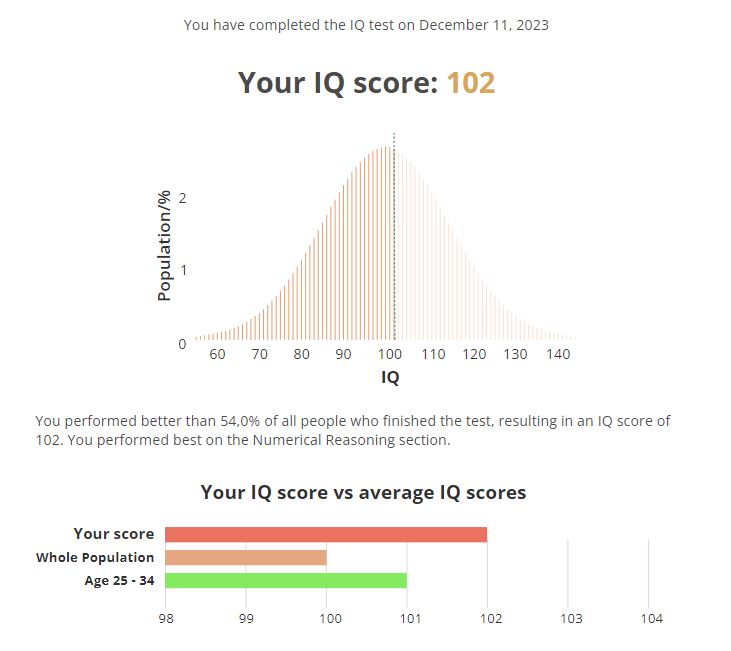
Take the first step towards self-awareness and intellectual enlightenment by embracing the opportunity to access accurate and instant results at no cost. Your cognitive adventure begins here. Embark on a journey of self-discovery and intellectual exploration without any cost attached. There is no need to register an account or pay a bucket amount of money to get the results. The test is completely fast, free, and without registration!
To get a high score on the test, we offer practical tips. From time management strategies to approaches for different question types, these insights aim to enhance your testing experience and bring out the best in your cognitive abilities.
Understand the Test Structure: Familiarize yourself with the structure of the IQ test. Know the number of questions, the types of questions, and the time limit. This understanding will help you pace yourself effectively.
Practice Regularly: Practice with sample questions to get a feel for the types of problems you might encounter. This not only improves your familiarity with the test format but also enhances your problem-solving skills.
Master Time Management: Given the time constraints of most IQ tests, it's crucial to manage your time wisely. Allocate a specific amount of time to each question, and if you find a question particularly challenging, consider moving on and returning to it later
Stay Calm and Focused: Finally, remain calm throughout the test. Anxiety can impede your ability to think clearly. Take deep breaths, focus on each question, and approach them with a clear and comfortable mind.
IQ tests are designed to measure an individual's intellectual abilities rather than their aptitude in specific areas. While they provide a general indication of a person's intellectual capacity, they may not capture the full spectrum of someone's talents or potential.
Aptitude, on the other hand, refers to a person's inherent capacity or potential to acquire specific skills or excel in particular areas. While IQ tests may correlate with certain aptitudes, they are not designed to comprehensively evaluate someone's potential in specific domains like music, art, sports, or other specialized skills. Aptitude assessments are usually more focused on measuring one's potential in a specific area.
IQ tests and Aptitude tests are both assessments designed to measure cognitive abilities, but they differ in their focus, purpose, and the specific abilities they evaluate. Here are the key differences between aptitude tests and IQ tests:
| IQ Tests | Aptitude Tests |
Measurement | Measure an individual's general cognitive abilities, including problem-solving skills, logical reasoning, pattern recognition, and memory. They provide a comprehensive assessment of overall intelligence. | Measure a person's potential to develop specific skills or perform well in a particular area. These tests assess natural abilities, talents, or capacities to acquire new skills. |
Scope | Broader scope. Evaluating a wide range of cognitive abilities without specific emphasis on one area. | Narrower scope. Focused on specific domains or skills, such as verbal, numerical, spatial, or technical aptitude. |
Purpose | Assess general cognitive abilities and are often used in educational settings, clinical assessments, and research. | Predict how well an individual is likely to perform in a specific task, job, or educational program |
Scoring | Standardized, with the average score set at 100. The distribution of scores follows a bell curve, allowing for comparison to the general population.
| Compared to a norm group to determine how an individual's abilities rank in comparison to others who have taken the same test. |
Applicability | Offer a more general assessment of cognitive functioning. | Tailored to practical applications in specific domains |
Mensa is an international society for individuals with high IQ scores. To join Mensa, one typically needs to score in the top 2% of the population on an accepted intelligence test. This corresponds to an IQ score of approximately 130 or above, depending on the specific test.
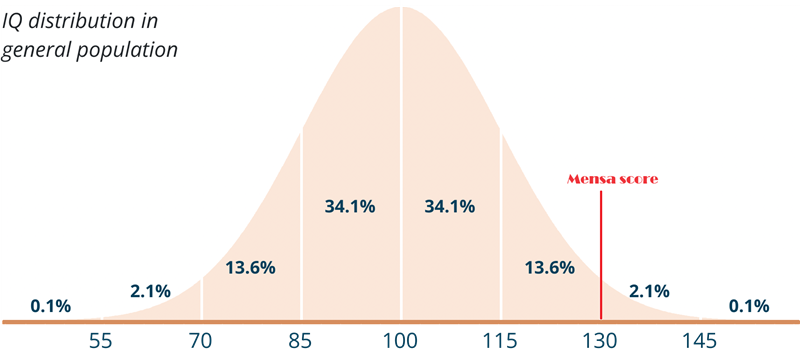
Mensa Membership: Achieving an IQ score within this elite range opens the door to Mensa membership, providing access to a community of intellectually curious individuals. Mensa serves as a platform for networking, engaging in stimulating discussions, and participating in various events tailored for high-IQ individuals.
Notable Achievements: Many Mensa members have made significant contributions to various fields, from technology and science to the arts. Mensa creates an environment where individuals with exceptional cognitive abilities can connect and collaborate.
Our free online IQ test with instant results is designed for self-assessment purposes. The results can offer valuable insights, from your IQ score to your strengths and weaknesses in different aspects of cognitive abilities. Our goal is to make the exploration of your cognitive abilities enjoyable, informative, and accessible to everyone.
It’s important to note that intelligence is multifaceted and IQ tests only assess several facets of an individual's intelligence, such as mathematical and logical skills. The test doesn't measure the entire human intelligence, including emotional intelligence, creativity, and practical skills.